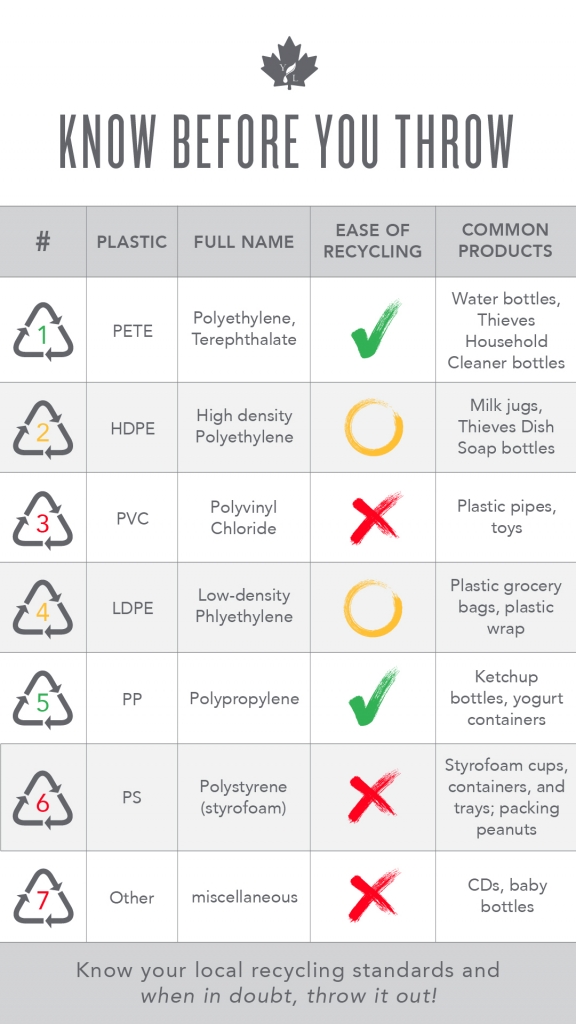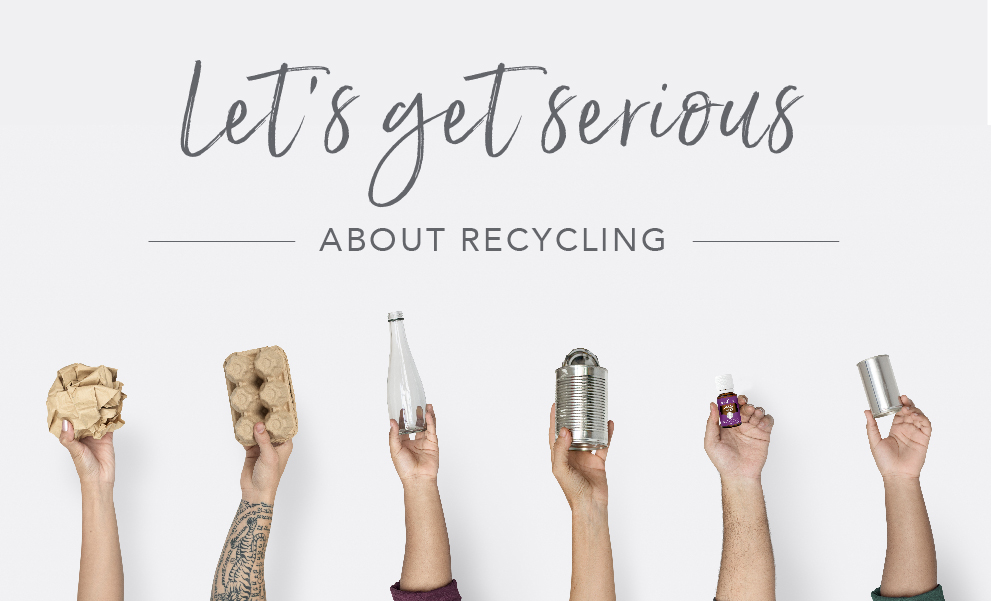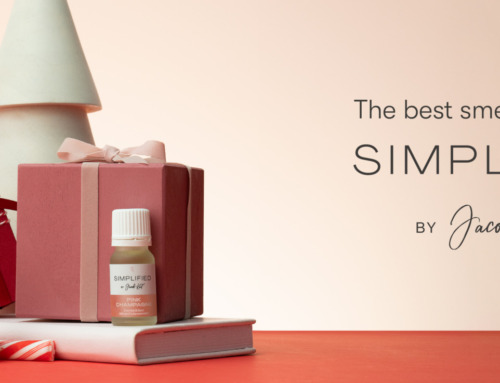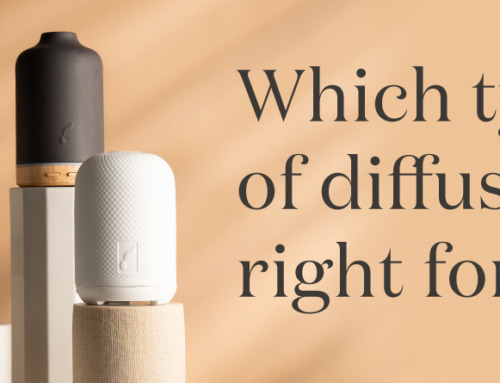We talk about the impacts of waste now more than ever. We know the importance of the 3 Rs: Reduce, Reuse, Recycle. And you do your part: your bills are paperless, your water bottles reusable and your drink cans are crushed. You’ve even found dozens of creative ways to reuse empty essential oil bottles! Yet many items that are universally recyclable almost always end up in the trash. As stewards of the earth, it’s each of our duty to sustainably manage our impact. So, let’s start with an action – small steps that we can take day-to-day: let’s get serious about recycling!
Why is recycling important anyway?
Recycling preserves resources and reduces the growth of landfills, protecting our communities today and for future generations.
Canadians consume 4.6 million metric tonnes of plastic each year. And the average person living in North America individually consumes 220 pounds of plastic each year! Let’s put that into perspective:
- 1 pound of plastic = approximately 50 empty water bottles
- 220 pounds of plastic × 50 water bottles per pound = 1,100 bottles
That’s a lot of plastic! It makes sense that at this very moment there are 5.25 trillion pieces of plastic in our oceans. But plastic
isn’t the only problem. Everyday items like metal food and drink cans, office paper, newspaper and cardboard are almost always universally recyclable – yet often end up in landfills instead.
What can you do to make a difference?
The best way to make a difference is to get empowered and learn what you can do to reduce your individual footprint.
First things first – no two cities are built the same when it comes to recycling. Recycling standards are as varied as the types of plastic in the ocean. Take time to sort through your local recycling standards – you might be surprised at what you unearth! Learn what is recyclable and where it can be recycled in your area.
While standards may vary, there are a few universal recyclables that you can count on, no matter where you live:
- Empty plastic bottles and jugs
- Clean tin foil and take-out containers or pie plates
- Empty metal food and drink cans
- Clean glass jars and bottles
- Clean office paper and newspaper
- Clean and flattened cardboard
Though not universally recyclable, glass is infinitely recyclable – meaning it can be recycled and remanufactured again and again. Recycling glass is important. If you do opt to trash it, it will take 1 million years for it to start to decompose. Luckily most types of glass are accepted curbside in most locations in Canada but be sure to check your local guidelines before you blue bin it!
What can you do with glass?
- Recycle your empty essential oil bottles, NingXia Red bottles, jars and condiment containers.
- Or, reuse these items!
- Donate glass dinnerware or drinking glasses to local charities – these items can’t be recycled.
Plastic is complicated, but as a rule, almost any hard plastic is recyclable – think items like Thieves Fruit & Veggie Soak, Seedlings Baby Wash & Shampoo and Super B. The key to figuring out whether a plastic item can be recycled curbside, at a recycling centre or recycled at all is a code found on the item itself. On plastics you’ll find a recycling symbol with a series of letters – it could be PETE, HDPE, PVC or others – which determines if and how the item can be recycled.
What can you do with plastics?
- Say goodbye to single-use plastics! Always pack a reusable mug for your coffee or tea and a stainless-steel water bottle for cold drinks. Have cutlery on-hand at work or wherever you plan to eat on-the-go.
- Opt for reusable shopping totes. Replace single-use plastic bags with a reusable alternative – we like this stylish YL option!
- Go for the sure thing. Look at our cheat sheet below to see what types of plastic can always be recycled.

Think before you (blue) bin it
Even with the best intentions, putting things in the blue bin that you think might be recyclable (but aren’t) causes all kinds of problems for recycling facilities. Plastic bags can be a culprit, but not if recycled properly. Before you recycle, check to see if the plastic bag or wrap stretches. If it does, recycle it! Be sure to bundle all of your stretchy plastic bags into a single bag and tie it closed before tossing it in the blue bin. If it crinkles or tears – like a chip bag or cellophane – throw it in the trash instead.
Some items that always belong in the trash include:
- Plastic utensils
- Dishware
- Straws
- Food or food-related paper
- Paper cups
- Plastic utensils
- Styrofoam
- Paper tissue
- Wood
- Tubes
- Furniture
- Batteries
- Wires
- Electronics
- Garden hoses
- Prescription bottles
- Needles
Another problematic contaminant is food waste. Anything saturated with food or grease is not recyclable, so rinse with soapy water before you recycle. Also, believe it or not, wet paper also can’t be recycled! If you aren’t sure it can go in the blue bin, follow this simple rule: when in doubt, throw it out!
The difference you’re already making
You may not know it yet, but by purchasing YL products you’re already doing your part! For example, our essential oil carrying case can be used for years to transport oils, avoiding the use of non-reusable materials for storing and transporting your oils.
Our packaging is almost entirely recyclable or reusable: cardboard boxes, bubble wrap, pillow packs and plastic bags. Behind the scenes, we’ve reduced the number of plastic bags used and made the switch to food-grade plastic bags so that you can more easily reuse them in your homes. While cardboard boxes and plastic bags can be recycled curbside, the bubble wrap and pillow packs need to be recycled through store drop-off. Most grocery stores offer this service! Find a store drop-off location near you.
The bubble wrap in your order boxes has its own unique sustainability story! Produced with post-industrial recycled materials, it provides top-notch damage protection to help prevent the need to re-manufacture products – minimizing the environmental impact of creating and shipping new products.
From transforming them into portable essential roll-ons with an AromaGlide fitment, to creating multipurpose deodorizers to refresh your drawers or gym bag, eco-friendly travel toiletry containers or simple centrepieces with one or two flowers in the bottle, you’ve impressed us with all the creative ways you reuse and recycle empty essential oil bottles! Some of you have even jazzed up your festive twinkly lights by removing the oil dropper and cap and slipping the empty bottle over each bulb.
The road to zero waste will have its challenges, but our chances for success are much greater when everyone joins our efforts to preserve the planet we love!
What are your favourite ways to reuse your YL products? Let us know in the comments!
This post is also available in: French






are the packing bubbles compostable ?
Hi Justine! The plastic packing bubbles are recyclable. Depending on where you live, you may need to recycle these at a recycling depot but typically they can be recycled curbside. Hope this helps!
Hi There
I’ve been using YL for 8mths now.
I love the products so far.
I would like to know if you do refillable’s of the house cleaning products eg Thieves concentrate, laundry etc. I would hate to contribute to landfill. Based on YL ethos I hope this option will be available in the very near future.
Looking forward to hearing from you soon.
Kindest regards
Maria
Hi Maria, Love to hear that you’re loving the products! We do not currently have a program in place to refill Thieves Household Cleaner bottles, however the container – and the packaging it was shipped in – is entirely recyclable. I hope this helps!
What is the best way to recycle Ningxia Bottles? Does YL have a policy to collect them? They are so pretty and I feel so bad throwing them away. Thanks.
Hi Lucy, We do not have a program in place to collect NingXia bottles, however they are 100% recyclable so no need to throw them away! Cheers